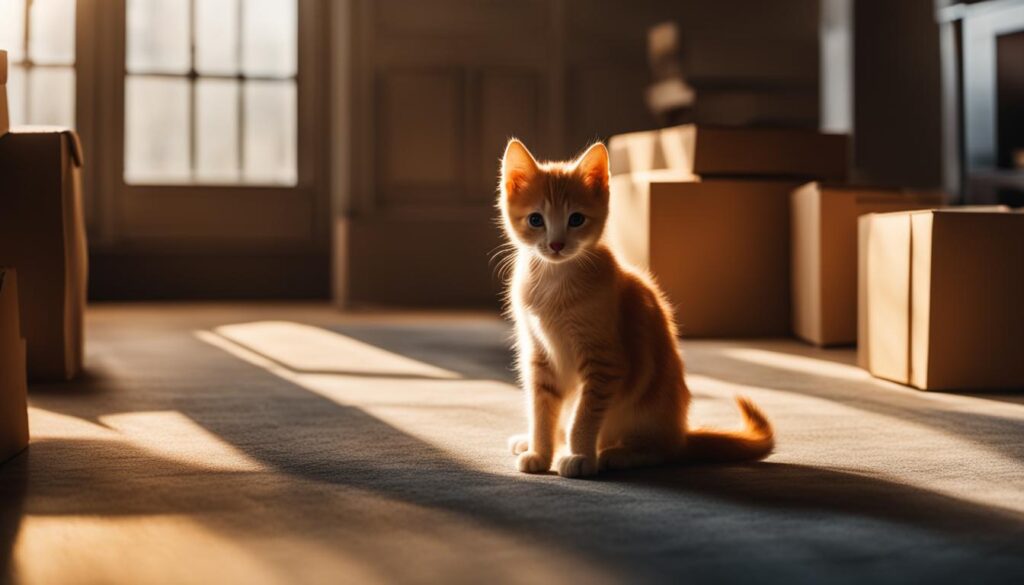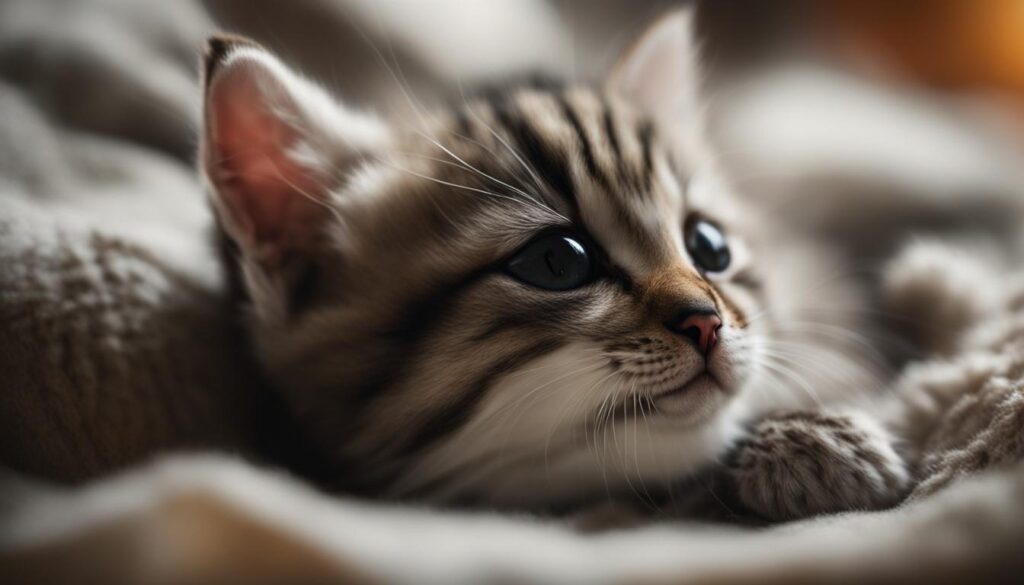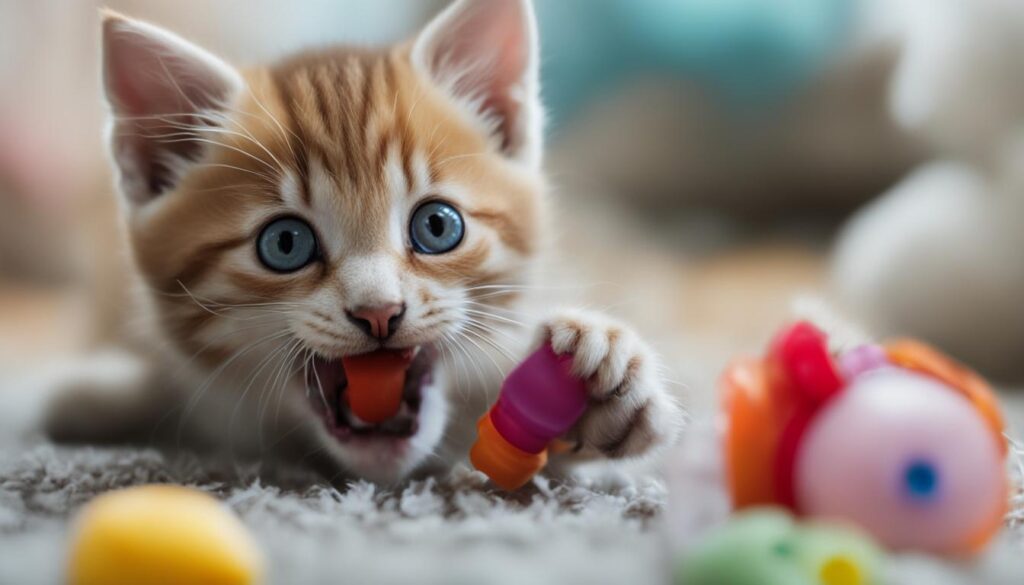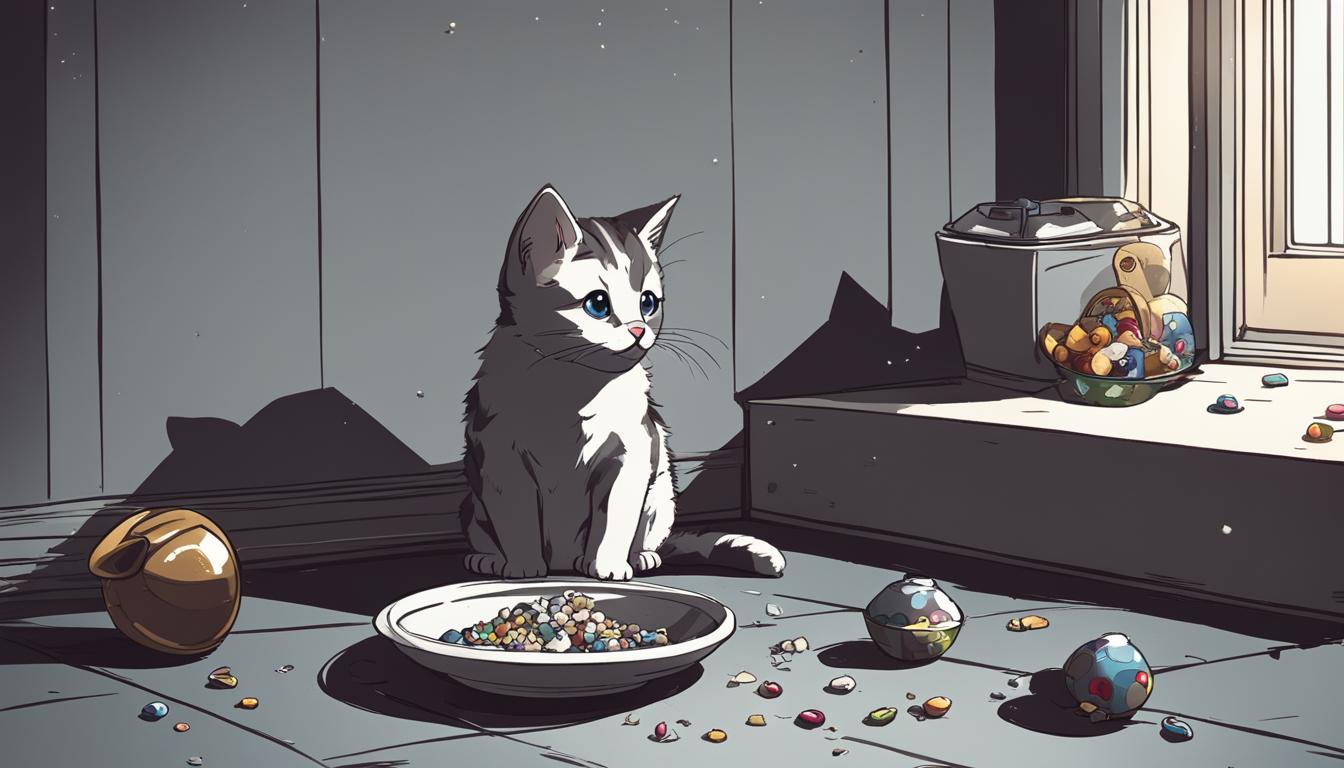Are you wondering why your adorable little kitten won’t stop crying? Don’t worry, you’re not alone. Kittens can cry for a variety of reasons, and it’s crucial to understand the causes behind their tears in order to provide them with the care they need. In this article, we’ll explore the common reasons why kittens cry and offer practical solutions to address their needs. So, let’s dive in and discover why your kitten is crying and what you can do about it.
Key Takeaways:
- Understanding the reasons behind your kitten’s crying can help you provide appropriate care and support.
- Kittens may cry due to loneliness, confusion in new surroundings, hunger, litter box issues, pain or discomfort, illness, or developmental milestones.
- Offering companionship, creating a secure environment, establishing a feeding schedule, ensuring a clean litter box, addressing pain or discomfort, and seeking veterinary attention for illnesses are important solutions for kitten crying.
- Soothing a crying kitten involves spending quality time with them, providing warmth and comfort, and meeting their physical and emotional needs.
- It’s essential to understand that crying is a natural form of communication for kittens and addressing their needs can create a harmonious environment for both the kitten and the owner.
Loneliness and the Need for Companionship
Kittens, like humans, crave social interaction and companionship. Loneliness can be a significant factor contributing to a kitten’s excessive crying. Spending quality time with your kitten, providing affection, and engaging in interactive play can help alleviate their feelings of loneliness.
It’s important to consider adopting another kitten to provide a constant source of companionship for your furry friend. A playmate can keep them entertained and engaged, reducing their reliance on you for constant attention. When introducing a new kitten to your household, ensure proper introductions and give them time to adjust to each other’s presence.
Symptoms of a Lonely Kitten
- Kitten crying for attention even when their immediate needs are met
- Excessive clinginess and constantly seeking human interaction
- Depressed or withdrawn behavior
By addressing your kitten’s need for companionship and providing them with a playmate, you can help alleviate their feelings of loneliness, reduce their excessive crying, and create a harmonious environment for both kittens.
| Advantages of Adopting Another Kitten | Considerations When Adopting |
|---|---|
| – Provides a constant source of companionship | – Introduce the new kitten gradually to avoid overwhelming your current kitten |
| – Reduces the kitten’s dependence on you for entertainment | – Ensure each kitten has their own space and resources |
| – Promotes socialization and healthy play behavior | – Monitor their interactions and intervene if necessary |
Remember, adopting another kitten should be a thoughtful decision based on your ability to provide additional care and attention. Ensure that you have the resources and time to meet the needs of both kittens before making this commitment.
Confusion and New Surroundings
Bringing a new kitten into your home can be an exciting time, but it can also be overwhelming for the little feline. The unfamiliar surroundings and new experiences can leave your kitten feeling lost and confused, leading to bouts of crying. Understanding how to help your kitten adjust to their new environment is essential for their well-being and your peace of mind.
One effective way to alleviate your kitten’s confusion is to gradually introduce them to their new surroundings. Start by creating a designated area in your home where your kitten can feel safe and secure. This space can be equipped with their essentials, like food, water, litter box, and a cozy bed. By providing a secure home base, your kitten will have a familiar place to retreat to when they feel overwhelmed.
Additionally, it’s important to introduce your kitten to other areas of your home gradually. Start by allowing them to explore one room at a time, gradually expanding their access as they become more comfortable. This gradual approach will give your kitten time to adjust to each new space without feeling overwhelmed by the entire home at once.
Familiar Scents and Comforting Items
Another helpful strategy is to provide familiar scents and comforting items for your kitten. This can include placing a blanket or piece of clothing with your scent in their sleeping area. Your scent will provide them with a sense of familiarity and comfort, easing their confusion and reducing their crying.
You can also consider using synthetic feline pheromone products, such as pheromone sprays or diffusers, to create a calming environment. These products mimic the natural pheromones that mother cats produce to comfort their kittens. By using these synthetic pheromones, you can help reduce your kitten’s anxiety and confusion, ultimately minimizing their crying.
Patience and Gentle Encouragement
When dealing with a confused and crying kitten, it’s crucial to be patient and provide gentle encouragement. Avoid scolding or punishing your kitten for their crying, as this will only heighten their anxiety and distress. Instead, offer reassurance through soothing words and gentle petting.
Remember, it takes time for kittens to adjust to new surroundings. With patience, love, and understanding, you can help your kitten feel more at ease and reduce their confusion and crying. Ultimately, your efforts will create a harmonious and happy environment for both you and your furry friend.

Hunger and Feeding Schedule
Kittens, like human babies, cry when they’re hungry. Ensuring that your kitten’s nutritional needs are met is crucial for their overall health and well-being. Establishing a proper feeding schedule and providing sufficient amounts of food can help address hunger-related crying and promote healthy growth.
Developing a feeding schedule is key to regulating your kitten’s food intake. Kittens typically need to be fed several times a day, as their small stomachs cannot hold large amounts of food at once. Consult with your veterinarian to determine the appropriate feeding frequency and quantity based on your kitten’s age and weight.
Feeding your kitten high-quality wet food is recommended, as it provides the necessary hydration and nutrients. Wet food is easier for kittens to digest and can help prevent dehydration, especially if they are not drinking enough water. Always check the label for age-appropriate feeding guidelines and choose a formula specifically designed for kittens.
| Age | Number of Meals per Day | Recommended Quantity per Meal |
|---|---|---|
| 6-8 weeks | 4 | 1/4 to 1/3 cup |
| 2-3 months | 3 | 1/3 to 1/2 cup |
| 3-6 months | 3 | 1/2 to 2/3 cup |
| 6-12 months | 2 | 2/3 to 3/4 cup |
It’s important to monitor your kitten’s weight and adjust their feeding amounts accordingly. Overfeeding can lead to obesity, while underfeeding can result in malnutrition. If you are unsure about the appropriate feeding quantities or notice any abnormal weight gain or loss in your kitten, consult with your veterinarian for guidance.
Remember to provide fresh water at all times and clean your kitten’s food and water bowls regularly to promote good hygiene. By establishing a consistent feeding schedule and meeting your kitten’s nutritional needs, you can help minimize hunger-related crying and ensure their healthy development.
Litter Box Issues
Kittens may cry if they’re experiencing difficulties with using the litter box. This can be a common issue during the transition period when they’re getting used to it. Ensuring the litter box is accessible, clean, and of the appropriate size for your kitten’s age can help alleviate any discomfort or confusion.
If your kitten is crying in the litter box, it could indicate that they’re having trouble finding it or using it properly. Placing the litter box in a quiet and easily accessible location can make it easier for them to find and use it when needed.
Furthermore, keeping the litter box clean is crucial for your kitten’s comfort. Scooping the litter box daily and providing fresh litter will encourage your kitten to use it regularly and reduce the chances of them crying due to a dirty or odor-filled litter box.
Common Difficulties with Using the Litter Box
- Kitten may not like the type of litter used. Experimenting with different types of litter, such as clumping or non-clumping, can help you find the one that your kitten prefers.
- The litter box may be too small or too high for your kitten to comfortably enter and exit. Ensure that the litter box is appropriately sized for your kitten’s age and has low sides for easy access.
- Your kitten may need more guidance in using the litter box. Take the time to gently place your kitten in the litter box after meals or when you notice signs that they need to eliminate, and praise them when they use it correctly.
- If your kitten continues to have difficulties with the litter box, consult with your veterinarian to rule out any underlying medical issues that may be causing the problem.
By addressing any potential difficulties with the litter box and providing the necessary guidance and support, you can help your kitten feel more comfortable and confident in using it, reducing their crying and ensuring proper elimination habits.

Pain or Discomfort
If your kitten is crying persistently, it could be a sign that they are in pain or discomfort. Kittens, like any other living beings, can experience various ailments that cause them distress. It is essential to pay attention to their cries and behavior to determine if they are in need of immediate veterinary attention.
Common causes of pain or discomfort in kittens include injuries, urinary tract infections, dental issues, and gastrointestinal problems. It is crucial to monitor your kitten closely for any signs of illness or injury, such as limping, difficulty eating or drinking, frequent urination outside the litter box, or changes in bowel movements. If you notice any of these symptoms, it is recommended to consult a veterinarian as soon as possible.
Keep in mind that kittens are more vulnerable to certain health conditions than adult cats. Their immune systems are still developing, making them more susceptible to infections and diseases. Additionally, kittens may not display obvious signs of pain or discomfort, so it is important to be vigilant and seek professional care if you suspect something is wrong.
Remember, kittens cannot communicate their pain or discomfort directly, so it is your responsibility as a pet owner to be proactive in ensuring their well-being. By providing them with regular veterinary check-ups, a balanced diet, and a safe environment, you can help prevent and address any potential health issues that may cause your kitten distress.

Common Signs of Pain or Discomfort in Kittens:
- Limping or reluctance to move
- Excessive grooming of a particular area
- Loss of appetite or difficulty eating
- Inappropriate urination or defecation
- Changes in behavior or personality
- Withdrawal or reluctance to interact
- Vocalizing more than usual, especially during activities
If you observe any of these signs in your kitten, it is important to seek veterinary attention promptly. Remember, early intervention can prevent further complications and ensure your kitten receives the necessary treatment to alleviate their pain or discomfort.
Illness and Distress
A sick kitten may exhibit distress through crying. It is essential to pay attention to any changes in your kitten’s behavior, as crying can be a sign of underlying health issues that require immediate medical attention. Not all illnesses are accompanied by audible distress, so it is crucial to be observant and proactive when it comes to your kitten’s well-being. Seeking prompt veterinary care can help diagnose and treat any illnesses, providing the necessary relief and comfort for your furry friend.
When a kitten is feeling unwell, they may appear lethargic, fatigued, or vacant. If your kitten exhibits these signs alongside crying, it is crucial to seek medical attention. Remember that kittens are fragile creatures, and even seemingly minor symptoms can indicate a more significant health issue. Consult with a veterinarian to ensure the proper diagnosis and treatment plan for your sick kitten.
“Crying is a common way for kittens to communicate distress, and it is our responsibility as caretakers to be vigilant and attentive to their needs. Seeking prompt medical attention when a kitten is crying and appears sick is crucial for their overall well-being.”
Regular check-ups and vaccinations can also help prevent illnesses and detect any potential problems early on. By maintaining a healthy lifestyle and providing proper care, you can reduce the likelihood of your kitten becoming sick and experiencing distress. Remember to always consult with a veterinarian for expert advice and guidance tailored to your kitten’s specific needs.
| Signs of Illness in Kittens | Actions to Take |
|---|---|
| Lethargy and fatigue | Seek veterinary care immediately |
| Loss of appetite | Monitor food intake and consult with a veterinarian if it persists |
| Vomiting or diarrhea | Contact a veterinarian for advice and potential treatment |
| Difficulty breathing | Seek emergency veterinary care |
| Unexplained weight loss | Consult with a veterinarian to determine the underlying cause |
Preventing Illness in Kittens
While illness can occur despite taking preventive measures, there are steps you can take to minimize the risk and keep your kitten healthy:
- Vaccinations: Ensure your kitten receives all necessary vaccinations as recommended by your veterinarian to protect against common diseases.
- Regular Veterinary Check-ups: Schedule regular check-ups to monitor your kitten’s health and address any potential issues early on.
- Proper Nutrition: Feed your kitten a balanced diet appropriate for their age and consult with your veterinarian for specific dietary recommendations.
- Hygiene: Keep your kitten’s living environment clean, including their litter box, to reduce the risk of infections.
- Parasite Prevention: Use appropriate preventive measures to protect your kitten from fleas, ticks, and other parasites.
- Stress Reduction: Minimize your kitten’s exposure to stressful situations and provide a calm and comforting environment.
By following these preventive measures and being attentive to your kitten’s health, you can help minimize the risk of illness and distress. Remember, a healthy and happy kitten is a cherished companion and a joy to have in your life.
Soothing a Crying Kitten
Kittens, like human babies, can cry for various reasons. It is essential to understand how to soothe a crying kitten to ensure their well-being and create a calm and secure environment for them. By meeting their physical and emotional needs, you can help alleviate their distress and reduce excessive crying.
One way to comfort a crying kitten is to spend quality time playing with them. Engaging in interactive play not only provides stimulation but also helps build a bond between you and your kitten. Use toys that encourage their natural instincts, such as feather wands or small balls, to keep them entertained and distracted from crying.
Providing warmth and comfort is another effective method to soothe a crying kitten. You can consider using a cozy blanket or a heated pad to create a comfortable and snug environment for them. The warmth can help relax their muscles and induce a sense of security, reducing their need to cry for attention or comfort.
| Tip | Key Benefits |
|---|---|
| Play soothing music | Creates a calming atmosphere |
| Offer a safe hiding spot | Gives them a sense of security |
| Try gentle massages | Promotes relaxation and bonding |
Additionally, providing affection and reassurance can go a long way in soothing a crying kitten. Gently stroking their fur, speaking to them in a calm and soothing tone, and offering reassuring words can help them feel loved and secure. Remember, kittens respond to your energy, so maintaining a calm and patient demeanor is essential.
Always remember to observe and address any underlying issues that may be causing your kitten to cry excessively. If you suspect pain, illness, or any other health concerns, it is crucial to seek veterinary attention promptly. By understanding and addressing the needs of your crying kitten, you can create a nurturing environment and ensure their well-being.
Developmental Milestones and Crying
Kittens go through various developmental stages as they grow, and these milestones can sometimes cause them to cry. One common milestone that often leads to crying is teething. Just like human babies, kittens experience discomfort and pain when their baby teeth start to break through the gums. This can cause them to cry and exhibit signs of irritability. To help ease their discomfort, providing appropriate chew toys specifically designed for teething kittens can offer relief and help redirect their chewing behavior away from valuable household items. It’s important to choose toys that are safe, durable, and suitable for their age.
During other developmental stages, such as socialization and exploration, kittens may also cry as they adapt to new experiences and environments. This is their way of expressing uncertainty and seeking reassurance from their caretakers. Patience and understanding are key during these times. Creating a safe and stimulating environment for your kitten, with plenty of toys, hiding spots, and interactive play, can help them navigate these stages with less distress. Remember, socialization and exploration are crucial for kittens to develop important life skills and build confidence.
“Developmental periods are important milestones in a kitten’s life. Understanding and responding to their needs during these stages is crucial for their overall well-being and emotional development.” – Dr. Jane Carter, Feline Behavior Specialist
It’s essential to remember that each kitten is unique and may progress through developmental stages at different rates. Some kittens may be more resilient and adapt quickly, while others may require extra support and patience. By observing and recognizing their individual needs, you can provide the appropriate care and guidance to help them navigate these milestones with minimal distress and ensure their overall growth and happiness.
Table: Developmental Milestones and Crying
| Developmental Stage | Signs of Crying |
|---|---|
| Teething | Irritability, excessive drooling, chewing on objects |
| Socialization | Seeking attention and reassurance, crying when separated from caretaker |
| Exploration | Crying when faced with new environments, objects, or experiences |

Conclusion
Kitten crying is a natural form of communication, through which they express their needs or distress. By understanding the different reasons behind a kitten’s cries, you can effectively address these needs and ensure their well-being.
Providing appropriate care and companionship is crucial in reducing excessive crying. Spend quality time with your kitten, playing, cuddling, and offering warmth and affection. Meeting their physical and emotional needs can help calm their cries and create a secure and happy environment.
In cases where a kitten’s crying persists or is accompanied by other concerning symptoms, seeking veterinary attention is recommended. Kittens may cry due to pain, illness, or discomfort, and it is important to identify and address any underlying medical issues.
By addressing your kitten’s crying and providing the necessary support, you can create a harmonious environment for both you and your furry friend. Remember, understanding their needs and providing appropriate care can significantly reduce excessive crying and ensure a strong bond between you and your kitten.
FAQ
Why is my kitten crying?
Kittens cry for various reasons, including loneliness, confusion, hunger, discomfort, illness, and developmental milestones.
How can I help my lonely kitten stop crying?
Spending quality time with your kitten and considering adopting another kitten to provide companionship can help alleviate their loneliness and reduce excessive crying.
My kitten is crying in its new home. What should I do?
Gradually introducing your kitten to their new surroundings and creating a designated area as their “home base” can help them feel secure and minimize crying due to confusion.
Why is my kitten crying for food all the time?
Just like human babies, kittens cry when they’re hungry. Establishing a proper feeding schedule and providing sufficient amounts of wet food can help address hunger-related crying in kittens.
How do I address litter box issues causing my kitten to cry?
Kittens may cry if they’re experiencing difficulties with using the litter box. Ensure the litter box is accessible, clean, and of the appropriate size for your kitten’s age to alleviate discomfort or confusion.
What should I do if my kitten is crying due to pain or discomfort?
It is crucial to identify and address the source of their discomfort, such as injuries or medical conditions, to provide necessary care and relieve their distress. Immediate veterinary attention is recommended for kittens exhibiting signs of pain or illness.
My kitten is crying and appears sick. What should I do?
If a kitten appears lethargic, fatigued, or vacant and is crying, it’s essential to seek prompt medical attention. Not all illnesses are accompanied by audible distress, so it’s crucial to be vigilant and observe any significant changes in behavior.
How can I soothe a crying kitten?
Spend quality time playing with your kitten, provide warmth, comfort, and affection. Meeting their physical and emotional needs can help calm their cries and create a secure and happy environment for them.
Why is my teething kitten crying? How can I help?
Crying in kittens can occur during specific developmental stages, such as teething. Providing appropriate chew toys and opportunities for them to explore their environment can help alleviate any discomfort associated with these milestones.
How can I address my kitten’s crying?
Understanding the various reasons behind kitten crying allows you to address their needs and ensure their well-being. Providing appropriate care, companionship, and veterinary attention when necessary can help reduce excessive crying and create a harmonious environment for both the kitten and the owner.




